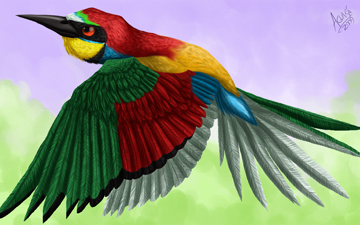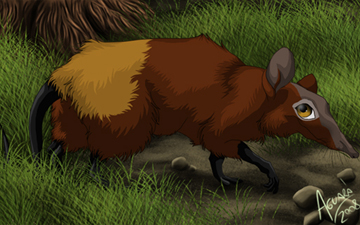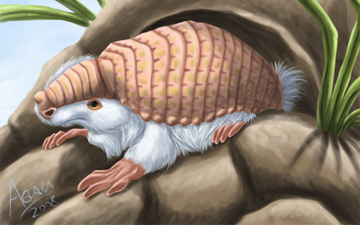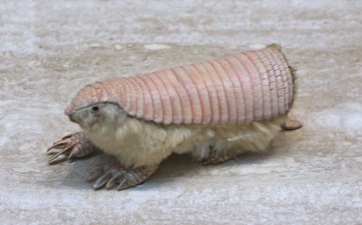Chordata

Spotted Salamander
Ambystoma maculatum


Sorry, there is no photo available. If you have one, please submit
here
.
7 POINTS
• Ambystoma maculatum has a MOVE of 2.
• Ambystoma maculatum can regenerate its limbs if lost.
Cool, Warm
Graphic by Sharon Jonessharonjones38.daportfolio.com/
The Spotted Salamander or Yellow-spotted Salamander (Ambystoma maculatum) is a mole salamander common in the eastern United States and Canada. The Spotted Salamander is the state amphibian of South Carolina. This salamander ranges from Nova Scotia, to Lake Superior, to southern Georgia and Texas [2] It has recently been found that its embryos havesymbiotic algae […] read more

Red Fox
Vulpes vulpes


Sorry, there is no photo available. If you have one, please submit
here
.
1 POINT
• Vulpes vulpes has a MOVE of 2
• Vulpes vulpes is a social animal. Red foxes live in groups which are led by one mated pair.
Cold, Cool, Warm
Graphic by Leighton Noyeswww.leightonnoyes.com
The Red Fox (Vulpes vulpes) is the largest of the true foxes, as well as being the most geographically spread member of the Carnivora, being distributed across the entire northern hemisphere from the Arctic Circle to North Africa, Central America, and the steppes of Asia. Its range has increased alongside human expansion, having been introduced […] read more

Nothobranchius foerschi
Nothobranchius foerschi


Sorry, there is no photo available. If you have one, please submit
here
.
9 POINTS
• Nothobranchius foerschi has a MOVE of 2.
• Nothobranchius foerschi is native to Tanzania.
Warm
Graphic by Teh-Aguaráteh-aguara.deviantart.com/
Nothobranchius foerschi is a species of fish in the Aplocheilidae family. It is endemic to Tanzania. Its natural habitat is intermittent freshwater marshes. Nothobranchius (Peters, W., 1868) is a genus of freshwater annual fish from East Africa in the family Nothobranchiidae which was long included in the Aplocheilidae. Many species have very small distributions. There […] read more

European Bee-eater
Merops apiaster



7 POINTS
• Merops apiaster has a FLIGHT of 2.
• Merops apiaster can eat as many as 250 bees per day.
Warm
Graphic by Teh-Aguaráteh-aguara.deviantart.com/
Photo by Dûrzan cîranocommons.wikimedia.org/wiki/User:D%C3%BBrzan_c%C3%AErano
The European Bee-eater (Merops apiaster), is a near passerine bird in the bee-eater family Meropidae. It breeds in southern Europe and in parts of north Africa and western Asia. It is strongly migratory, wintering in tropical Africa, India and Sri Lanka. This species occurs as a spring overshoot north of its range, with occasional breeding […] read more

Golden-rumped Elephant Shrew
Rhynchocyon chrysopygus



8 POINTS
• Rhynchocyon chrysopygus has a MOVE of 2.
• Rhynchocyon chrysopygus has thickened skin beneath its golden rump to protect against predators.
Warm, Hot
Graphic by Teh-Aguaráteh-aguara.deviantart.com/
Photo by Joseph Smiten.wikipedia.org/wiki/Joseph_Smit
The Golden-rumped Elephant Shrew (Rhynchocyon chrysopygus) is the largest of the African elephant shrew family. It is the size of a small rabbit, and is only found in the coastal Arabuko Sokoke National Park north of Mombassa in Kenya. Its name is derived from the conspicuous golden fur on its hindquarters which contrasts strongly with […] read more

Pink Fairy Armadillo
Chlamyphorus truncatus



3 POINTS
• Chlamyphorus truncatus has a MOVE of 2.
• Chlamyphorus truncatus is the world’s smallest armadillo.
Warm, Hot
Graphic by Teh-Aguaráteh-aguara.deviantart.com/
Photo by Cliff1066www.flickr.com/photos/nostri-imago/
The pink fairy armadillo (Chlamyphorus truncatus) or pichiciego is the smallest species of armadillo (mammals of the familyDasypodidae, mostly known for having a bony armor shell). It is found in central Argentina, where it inhabits dry grasslands and sandy plains with thorn bushes and cacti. The pink fairy armadillo is approximately 90–115 mm (3.5-4.5 inches) long, excluding […] read more